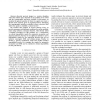136 search results - page 27 / 28 » Security Proofs for Identity-Based Identification and Signat... |
EUROPKI
2007
Springer
15 years 5 months ago
2007
Springer
Millions of citizens around the world have already acquired their new electronic passport. The e-passport is equipped with contactless communication capability, as well as with a s...
105
click to vote
IPPS
2007
IEEE
15 years 5 months ago
2007
IEEE
Most of the current trust models in peer-to-peer (P2P) systems are identity based, which means that in order for one peer to trust another, it needs to know the other peer’s ide...
CRYPTO
2005
Springer
15 years 5 months ago
2005
Springer
The Full-Domain Hash (FDH) signature scheme [3] forms one the most basic usages of random oracles. It works with a family F of trapdoor permutations (TDP), where the signature of m...
CSFW
2010
IEEE
15 years 3 months ago
2010
IEEE
—Security protocol design is a creative discipline where the solution space depends on the problem to be solved and the cryptographic operators available. In this paper, we exami...
CRYPTO
2006
Springer
15 years 3 months ago
2006
Springer
In a seminal paper, Feldman and Micali (STOC '88) show an n-party Byzantine agreement protocol tolerating t < n/3 malicious parties that runs in expected constant rounds. H...



